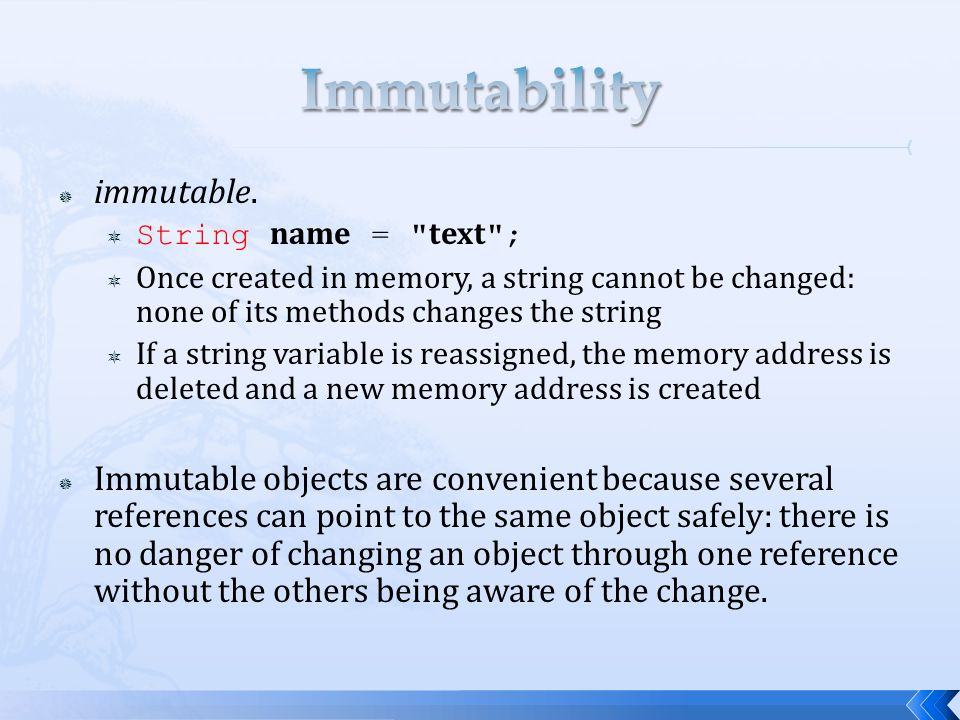Why Are Strings Immutable in Java? Security and Efficiency Perks
Why Are Strings Immutable in Java? Security and Efficiency Perks
Blog Article
Discovering the Benefits of Immutable Strings in Modern Programming Paradigms
In the world of modern programming paradigms, the concept of unalterable strings stands as a keystone of durable software application advancement. By embracing unalterable strings, designers can make sure boosted information honesty, enhanced string security, streamlined debugging procedures, enhanced safety steps, and effective performance optimization.
Improved Information Honesty

By protecting against the modification of string items, immutability eliminates the threat of unintentional adjustments to the information they hold. This not just enhances the security of the details yet likewise improves the reliability of the code that counts on these strings.
Immutability likewise sustains much safer multithreading atmospheres, as concurrent access to unalterable strings does not posture the threat of data corruption via simultaneous modifications. This building streamlines the process of handling strings in parallel programming scenarios.
In essence, immutability works as a protective shield around the data saved within strings, enhancing their stability by making certain that once specified, their worths remain unmodified throughout the program's execution.

Improved String Security
Unalterable strings enhance the thread security of programs by making certain that as soon as a string things is created, its value can not be modified. This building eliminates the threat of concurrent strings attempting to modify the very same string concurrently, which can bring about information corruption or inconsistent states in the program - Why are strings immutable in Java?. In a multi-threaded environment, where several strings gain access to and control information concurrently, the immutability of strings offers a degree of safety and security by ensuring that the information remains the same throughout its lifecycle
Simplified Debugging Processes
Offered the boosted string safety and security assisted in by unalterable strings, a significant advantage emerges in the world of simplified debugging procedures. Immutable strings, once created, can not be changed, making it less complicated to trace the circulation of information and identify the resource of pests in a program. This immutability makes sure that strings remain constant throughout the implementation of the program, reducing the chance of unanticipated adjustments that might lead to errors.
When debugging with mutable strings, programmers typically come across concerns where a string's value is changed inadvertently, making it challenging to determine the origin of a bug. Nonetheless, with unalterable strings, the data continues to be unmodified, allowing developers to concentrate on analyzing the real reasoning of the code as opposed to finding where and when a string was customized improperly.
Furthermore, unalterable strings simplify the debugging process by making it possible for simpler reproduction of pests. Because immutable strings do not change state, programmers can recreate and examine insects extra effectively, causing quicker identification and resolution of issues within the codebase. This structured debugging operations eventually adds to higher software application quality and enhanced general development performance.

Increased Safety And Security Actions
Enhancing information defense and fortifying system integrity, the application of unalterable strings in software application applications adds dramatically to increased safety and security actions. Immutable strings likewise play a crucial role in protecting against common protection vulnerabilities such as barrier overflows and SQL injection attacks, as efforts to adjust string data at runtime are naturally limited.
Moreover, the immutability of strings improves the predictability of program habits, making it simpler to confirm inputs and protect against unforeseen adjustments that might endanger protection. This predictability simplifies the process of auditing and confirming code, enabling developers to recognize potential security technicalities a lot more successfully. On the whole, incorporating immutable strings into software development methods not only boosts the toughness and integrity of applications yet additionally reinforces their strength against protection dangers.
Reliable Efficiency Optimization
When dealing with mutable strings, operations like concatenation or substring creation typically result in the development of new string items, leading to memory expenses and boosted handling time. By Continued allowing strings to stay continuous and unchangeable, unalterable strings promote far better memory administration and caching chances, eventually increasing the total performance of the software.
Immutable strings also play an essential duty in multithreaded atmospheres by advertising string security. Why are strings immutable in Java?. Since immutable strings can not be customized as soon as produced, they can be shared throughout strings without the risk of unforeseen adjustments, reducing the requirement for synchronization devices and improving concurrency. Furthermore, immutable strings simplify debugging processes as programmers can trust that a string's value will continue to be consistent throughout the program's implementation, eliminating possible errors brought on by mutable state changes. To conclude, making use of unalterable strings not just improves safety but also significantly contributes to the efficient efficiency optimization of modern software systems.
Conclusion
In verdict, the benefits of making use of unalterable strings in modern programming standards can not be overemphasized. Enhanced information honesty, boosted string safety, simplified debugging procedures, raised security procedures, and effective performance optimization all add to the overall efficiency of programs tasks. By integrating unalterable strings right into programming methods, programmers can gain from an extra robust and trustworthy codebase.
Immutability, a key function of strings in programming languages such as Java and Python, ensures that when a string item is created, it can not be modified or changed.Unalterable strings enhance the thread safety of programs by making certain that once a string item is produced, its worth can not be customized. Immutable strings additionally play an important duty in preventing typical protection susceptabilities such as barrier overflows and SQL shot attacks, as attempts to manipulate string data at runtime are naturally restricted.
By permitting strings see it here to stay consistent and unchangeable, unalterable strings help with much better memory monitoring and caching possibilities, inevitably boosting the general performance of the software.
Unalterable strings simplify debugging processes as designers can rely on that a string's worth will certainly stay constant throughout the program's execution, eliminating prospective errors caused by Learn More mutable state changes.
Report this page